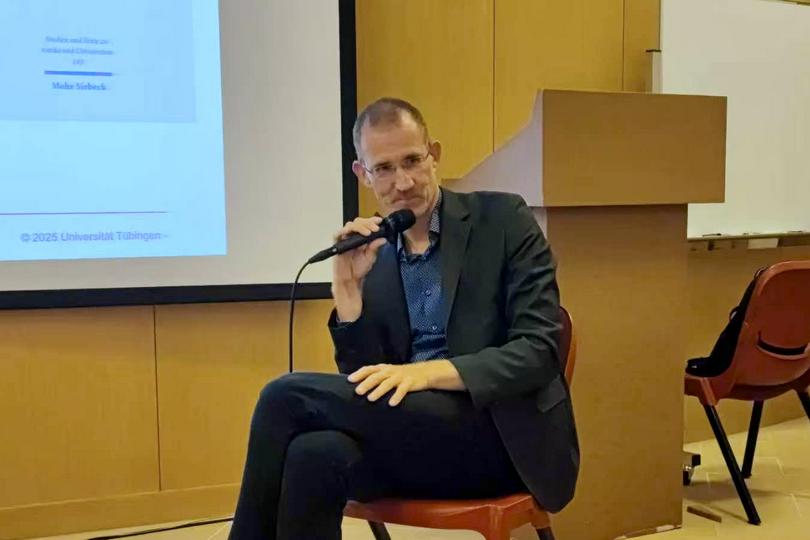On September 16, 2025, at the Divinity School of Chung Chi College, Prof. Dr. Volker Henning Drecoll of Eberhard Karls Universität Tübingen delivered a lecture titled "Basil's Exegesis of Gen. 1." The presentation offered a systematic analysis of the exegetical methodology of the fourth-century church father, Basil of Caesarea, as articulated in his nine homilies on creation, the Hexaemeron.
Prof. Drecoll first contextualized Basil's work by identifying two prevalent interpretive challenges he sought to address. The first was the danger of allegorical speculation, where interpreters would bypass the plain sense of the text to find hidden meanings, often importing their own philosophical notions into Scripture. The second was the opposite error of a misguided literalism that treated Genesis as a scientific textbook, leading to debates over cosmology (such as the shape of the earth), which Basil considered a distraction from the text's primary theological purpose.
To construct his alternative, Basil relied on a specific theory of knowledge. Prof. Drecoll explained this as a chain moving from objective reality to human language. The physical world exists independently, but human senses perceive only a fragment of it. These perceptions form concepts in the mind, an active but fallible process. Language, in turn, is an even more limited tool to express these concepts. Because human concepts are inherently unreliable, Basil argued for the necessity of an external anchor, which he located in the words of Scripture, held to be guided by the Holy Spirit.
Based on this foundation, Basil's exegetical solution begins with an uncompromising commitment to the literal meaning. Prof. Drecoll highlighted Basil's principle, "When I hear grass, I think of grass," to illustrate this starting point. This does not, however, lead to a flat or anti-symbolic reading. For Basil, "grass" first and foremost means the real, physical grass that grows from the earth. This literal reality then serves as a springboard for further, biblically grounded reflection. It can remind the reader of Isaiah 40, where grass is used as a powerful image for the transience of human life ("All flesh is grass"). Prof. Drecoll emphasized that this is not an allegory but an "intra-biblical comparison." The process is legitimate because it starts with the literal text and connects it to another part of Scripture, rather than importing an external idea.
Prof. Drecoll concluded by explaining the ultimate theological application of this method. Basil makes a crucial distinction between God's unknowable substance (ousia) and His knowable activities or operations (energeiai). While the divine essence remains forever beyond human language and conception, God's attributes are made manifest through His works in creation. Therefore, by studying the created world as presented in Genesis, one can come to a true, albeit partial, knowledge of God as the good, wise, and powerful Creator. This distinction between unknowable substance and knowable activities is central to Basil's entire theological project.
The lecture was followed by a Q&A session. It was clarified that Basil's primary innovation was pastoral: he redirected the focus of Genesis interpretation from scientific debate toward the goal of strengthening faith. It was also noted that Basil's use of non-Christian philosophy was pragmatic rather than deferential, marking a transition toward greater intellectual self-confidence within Christianity. Finally, regarding the use of terms like "Father" and "Son," it was explained that these are accepted as divinely revealed language, and the readers' task is to elevate their understanding to fit the divine mystery, rather than reducing it to human analogies.












